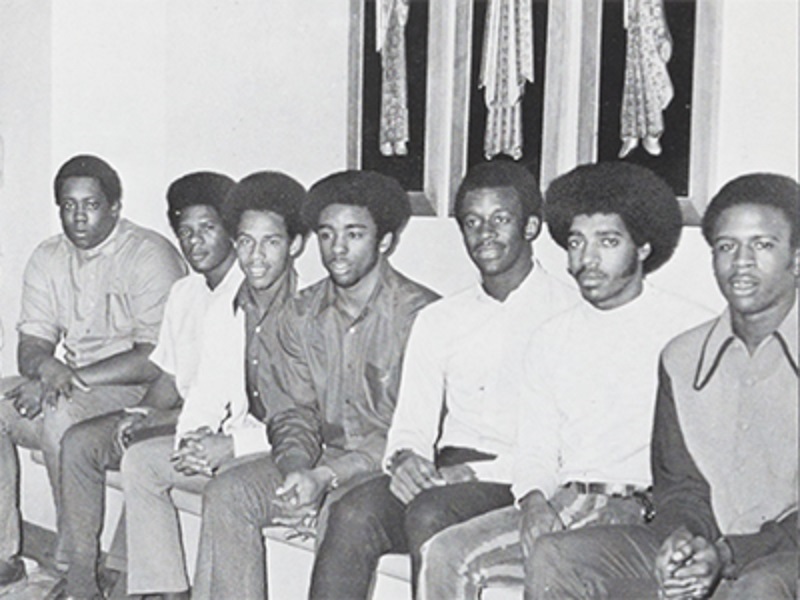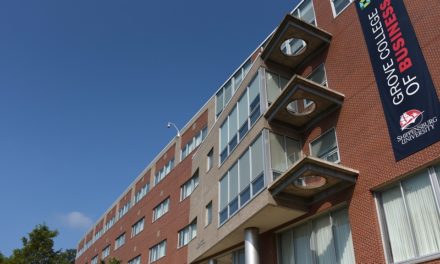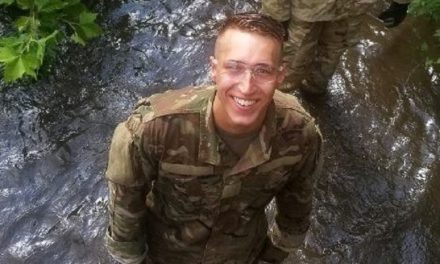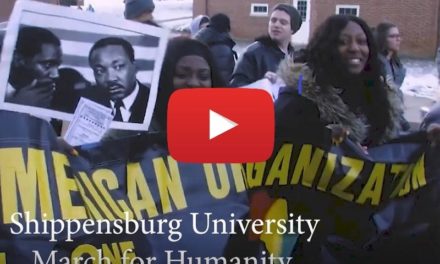By Katie (Paxson) Hammaker ‘93
Shippensburg University’s African American Organization is celebrating its 50th anniversary this year. But the real cause for celebration comes from each student participant who succeeded, in college and in life, and has changed our world as capable leaders and bridge-builders.
The organization, originally known as Afro Am, provides a vital source of social, academic, and cultural support for African American students on campus.
“We should celebrate African-Americans and all people of color,” said Diane L. Jefferson ’76, director of the Office of Multicultural Student Affairs. “We’ve been here and contributing to campus. We’ve added to the history of this mighty Ship.”
African American students have been part of the Shippensburg community since its inception. A rise in activism on campus in the 1960s, reflecting societal changes of the time, led to dialogue between students and administration about race relations. From this, the African American Organization was created in 1971.
“Afro Am was one of the biggest bridges on campus for students of color,” said Jerome Dean ’82. “You could talk, relax, and just be yourself with no pressure.”
Dean, a first-generation college student, entered through Shippensburg’s ACT 101 Program, now the Academic Success Summer Bridge Program, to help under-prepared students transition to college life. The rural, predominantly white institution was quite a shift from his suburban Philadelphia hometown. At the time, there were about 250 students of color on the campus of 4,600.
Dean said that he acclimated well to campus but admits that he encountered subtle forms of racism throughout his four years. Usually in the way of inappropriate comments in class or students who refused to share the dormitory restroom with him.
That’s what led Dean to the African American Organization where he found strength and comfort. He attended monthly meetings and social events held by the organization. They would talk about relevant racial and other news issues of the day, campus events, classes, professors, or any other topics of choice.
“It was really more or less just a family sitting down together to dinner and discussing things,” Dean said. “The lessons and mentors this group provided was so important. I looked up to the upperclassmen and learned from them.”
Dean also credits the late Dr. Elnetta Jones, a campus administrator, and the professors who fought hard for students of color. “They wanted us to succeed,” he said. “I did not truly realize their influence until many years later.”
Jefferson, also a first-generation college student and ACT 101 alumna, said she had no problem as a person of color on a predominantly white campus. She was the only African American in her high school class, and the first African American in her county to attend college. But the campus was not prepared for her and other students of color in the early 1970s.
“Some students and faculty were not sure that we had what it takes to succeed,” Jefferson said. “We proved them wrong.”
The African American Organization, then in its infancy, provided a strong foundation for Jefferson. “I don’t know what we would have done without them,” she said. “We gained support and could just breathe.”
Jefferson additionally sang with the Harmonic Voices of Truth gospel choir, which she described as her spiritual reinforcement. “Many of us were involved in a church at home. Choir was a refuge for us.”
A Safe Place for All Students
The African American Organization continues to thrive and serve an important role on campus. It now falls under the umbrella of the Office of Multicultural Student Affairs (MSA), established in 1989 by former President Anthony Ceddia.
First and foremost, MSA’s mission is to retain and graduate students. MSA also strives to educate students about diversity and to build future leaders, not just for the workforce, but culturally competent leaders who can work with others of all backgrounds.
“We are now on a global stage,” Jefferson said. “I don’t think we can afford not to be culturally aware and engaged.”
MSA also provides a safe space where all students can be heard. “My job is to help students give voice to their feelings and hurt, and to attempt to make others aware of the issue, and design ways to address it,” Jefferson said.
In addition to the African American Organization, MSA provides oversight to the chartered Asian-American and Latino Organizations, African Student Association, Multi-Ethnic Student Association, and Harmonic Voices of Truth, also celebrating its golden anniversary this year.
Racism persists in our society and the campus community is not immune. Jefferson sees it as most pervasive in the residence halls, and usually involves the use of inappropriate and offensive language..
Senior Alycia LaLuz has witnessed this behavior, both spoken and written, in the residence halls as a resident advisor. Like offensive messages left on a resident’s door. “I think subtle racism is actually more dangerous,” she said. “We can’t call people out and correct racism if we can’t identify the offender.”
“You will almost certainly experience some adversity as a student of color,” said Kapri Brown ’11-’15m, assistant to the director of Multicultural Student Affairs.
As a first-year student at Ship, Brown was mentored by older MSA students. She said that made all the difference in keeping her enrolled.
MSA involvement also challenged Brown, an introvert, to step outside of her comfort zone and find her voice. She especially learned to speak up against injustices suffered by other MSA groups and members. “We supported each other. We weren’t all people of color, but we were all people who were facing a struggle.”
“MSA really is a place for anyone, black, white, purple, or pink,” Brown said. “We have a ‘whatever it takes’ mentality and model, because not every student’s needs are the same.”
For Melissa Wilbur Morgan ’06-’08m, who is part Native American, ethnicity was not her primary concern when she arrived on campus. “As a first-generation college student, I was very nervous about my ability to excel in or even to pass college.”
Morgan grew up in a small town in northeastern Pennsylvania where her ethnicity was never an issue, but Shippensburg was different. “People asked, ‘What are you?’ Not in a bad way, but I was not used to being asked that all the time.”
Morgan did not personally experience racism on campus, but she witnessed the use of inappropriate comments. “It’s part of the reason I felt more comfortable at MSA, amongst people from all different backgrounds.”
Morgan had a friend in the Latino Student Organization who encouraged her to join. “I am not Latina, but this is where I felt like I fit in.”
Morgan began attending MSA meetings and events. The meetings were informational, but they also served as “mental health check-ins,” according to Morgan. “People could share if they were having an issue on campus. Mrs. Di would refer us to services and personnel for help.”
Students did not always have to ask for help. “Ms. Di just knew if something was wrong with someone, and she had this way of pulling it out of them,” Morgan said. “We don’t know how she did it.”
Jefferson, or “Ms. Di” as she is affectionately known to most, has been called the heart of the MSA. She has been at the head of MSA since its inception. That’s her official job description. Unofficially, Jefferson has served as an advocate, mentor, teacher, and friend to countless students.
Jefferson is also known to freely dispense hugs. Many students, faculty and staff alike have been comforted and found their way through a difficult day with help from one of Ms. Di’s hugs.
“I can only hope to make an impact on students like Ms. Di has made on me,” said La Luz, who hopes to become a college professor someday.
“You learn to love Ship because you’ve connected with it, and you’re connected because of people like Ms. Di,” Morgan said.
Learning By Experience
MSA offers numerous activities and events throughout the school year. Most are student organized and led, a fact that Jefferson takes pride in.
“Ms. Di helped, but she made us do the work,” Morgan said. “And she held us accountable. If we did not show up for a commitment, she would follow up even if it meant calling a student early on a Saturday morning.”
“Ms. Di would challenge us, for example to make a public speech or presentation,” Morgan continued. “She would make us get up and do it.” It’s a skill that is critical in Morgan’s work today as a government relations specialist.
PEERS (Promoting Excellence through Establishing Relationships for Success), a well-known program, helps first-year students acclimate to college life. The REAL (Rigorous Expectations of All Leaders) Institute teaches students leadership skills through hands-on experience.
Cultural festivals such as the Latino Explosion, Pride Fest, Diversity Festival, Soulful Saturday Black History Celebration, and Asian New Year Extravaganza publicly honor diverse and underrepresented groups of people.
In Living Color, a theatrical group, performs plays that were inspired by real-life experiences. Students then facilitate dialogue with audience members.
LaLuz discovered MSA through her participation in the Heritage Dancers Company. The group uses student-directed classical, jazz and modern dance performances to educate campus and the community about cultural uniqueness.
Building Bridges prepares students to facilitate discussions on diversity in the classroom.
Each One, Reach One, Teach One, a hallmark of MSA, provides service-learning opportunities. Projects include the African American and Latino Youth Summits, The Haiti Project, Roots African Village Project, and the STEP (Striving to Educate People Program) tutoring initiative.
Most MSA events are free and open to the public.
Giving Back
For many MSA alumni, participation does not end with graduation. They retain strong ties to the organization and are more than happy to give back.
When asked to speak at a Latino Conference hosted by MSA, Morgan said yes without hesitation.
Dean, recently retired from a distinguished career as an auditor for the IRS and federal agent with the Environmental Protection Agency, remains active with the SU Foundation Board and as a mentor with the College of Business.
“I love talking to students and giving back,” Dean said. “Education is a game-changer. That’s what I tell young people.”
Get Involved
For more information on MSA or to get involved in MSA-sponsored events, visit ship.edu/msa or call (717) 477-1616.





